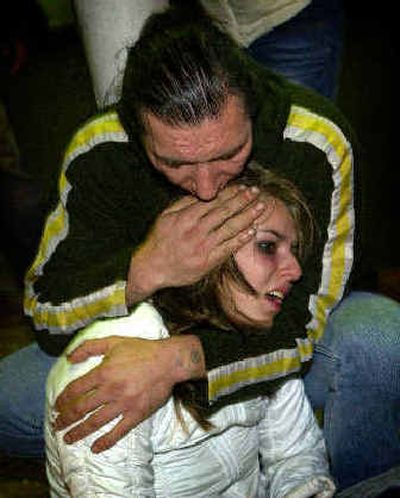Suicide bomber hits club, challenging peace process

TEL AVIV, Israel – A Palestinian suicide bomber blew himself up in a crowd of young Israelis waiting outside a nightclub near Tel Aviv’s beachfront promenade, killing at least four other people, wounding dozens and shattering an informal Mideast truce.
The blast, just before midnight Friday, ended several weeks of calm and presented the first serious test to the unofficial cease-fire declared by Israeli Prime Minister Ariel Sharon and Palestinian leader Mahmoud Abbas on Feb. 8 at a dramatic summit in Egypt.
Israeli officials indicated the attack would not derail the tentative peace efforts. But the bombing put new pressure on Abbas to take action against militants, who have not formally accepted the truce.
The Palestinians must “do much more to prevent such attacks,” said Gideon Ezra, the Israeli public security minister. Despite the violence, he said contacts with the Palestinians should continue.
There was no official claim of responsibility. But Palestinian officials and militant leaders said the Lebanese guerrilla group Hezbollah had orchestrated the attack.
Abbas pledged to track down those responsible, accusing them of trying to derail the peace process.
“The Palestinian Authority will not stand silent in the face of this act of sabotage,” Abbas said in a statement after holding an emergency meeting early today with his security chiefs. “We will follow and track down those responsible and they will be punished accordingly.”
Palestinian security officials, speaking on condition of anonymity, said the Israeli army identified the bomber as Abdullah Badran, 21, a university student. Israeli officials arrested five people, the officials said, including two of Badran’s brothers and the local imam.
Israeli troops also imposed a curfew on the West Bank village of Deir al Ghusun today, the apparent home of Badran, the Palestinian officials said.
The Israeli army said troops had carried out an arrest raid and that a curfew had temporarily been imposed but gave no further details. Israel this month said it would no longer destroy the homes of suicide bombers – a practice once common – because an army review concluded it didn’t deter attacks but did inflame hatred.
Israeli Defense Minister Shaul Mofaz was to convene a meeting of security chiefs later today to discuss an Israeli response, Israeli Army Radio reported.
In Washington, Secretary of State Condoleezza Rice condemned the attack “in the strongest possible terms” and said it is essential that Palestinian leaders take “immediate, credible steps” to find those responsible.
Rice took note of the Palestinian condemnation of the attack. “We now must see actions that send a clear message that terror will not be tolerated,” she said.
Hezbollah has emerged as the biggest threat to the fragile Israeli-Palestinian truce, offering West Bank gunmen thousands of dollars to attack Israelis. The group, which is backed by Iran and Syria, has hundreds of West Bank gunmen on its payroll, according to Palestinian security officials.
Hamas, Islamic Jihad and the Al Aqsa Martyrs’ Brigades, the largest Palestinian militant groups, all denied involvement, saying they were respecting the recent calm.
“If it turns out that indeed an individual from the brigades carried out this attack, everyone must know that they acted alone, and that the Aqsa Brigades does not identify with him and does not recognize him as a member,” said Abu Mahmoud, the group’s official spokesman.
However, a senior Al Aqsa commander said one of its members had been recruited by Hezbollah to carry out the attack. The commander spoke on condition of anonymity.
A senior Palestinian security official, speaking on condition of anonymity, also said the bomber was hired by Hezbollah. Palestinian officials said they had been tracking communications between Hezbollah and Al Aqsa militants in the northern West Bank in recent days.
Al Aqsa, which is loosely linked to Abbas’ Fatah party, has largely honored Abbas’ efforts to maintain the cease-fire. But rogue elements of the militant group are widely believed by Israeli and Palestinian officials of receiving orders and funding from Hezbollah.
In Beirut, a Hezbollah official declined involvement. “As far as we are concerned, there is no need to respond to such lies,” the official said.
The bombing occurred at the Stage, a nightclub located near Tel Aviv’s seaside promenade, as about 20 to 30 people were waiting to enter the club. The area was especially busy on a mild weekend night.
“Suddenly there was this huge explosion and we just ran,” said Merav Ayush, a 20-year-old club goer. “I saw a boy and a girl sitting on the ground. At the entrance to the club there were about 15 people just lying on the floor,” she said.
Tel Aviv police chief David Tzur said security guards outside the club spotted the bomber and didn’t allow him in. “The impact, if he would have gone inside, would have been tragic,” he said.
He said four people were killed and dozens wounded. At least one of the dead was female. Israeli police said about 50 people were wounded, more than 10 of them seriously.